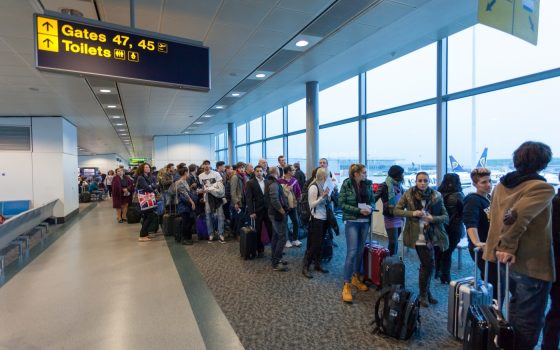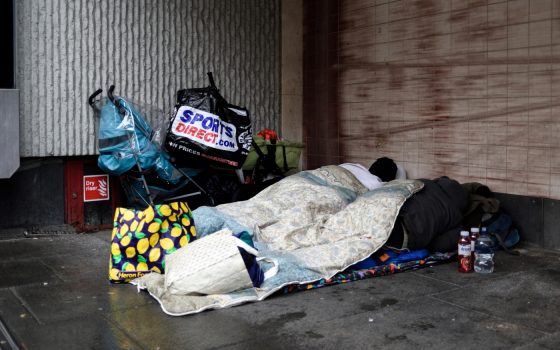What the defeat of the Super League teaches us about standing up to power
We need to commit to building the power of ordinary people to fight against wealthy elites
24 April 2021
The swift demise of the European Super League (ESL) this week is a lesson in how organised people can withstand the power of wealthy elites. As an organiser, I spend my days supporting people to take on the greed and grotesque power of those who control their lives, whether landlords, property developers or employers.
When the news of the ESL broke on Sunday, prime minister Boris Johnson was falling over himself to pledge allegiance to angry fans. On the brink of local elections where the Conservatives hope to win even more seats in former industrial communities once loyal to Labour, the party is following the whiff of strong working class sentiment like a terrier’s nose follows a plate of chops.
Johnson’s usual ideological opposition to intervening in private enterprise, whether that’s stepping in to save thousands of jobs at Liberty Steel, or regulating to reign in the worst excesses of greedy landlords, vanished this week as he promised a “legislative bomb” to see off the ESL. Johnson and his team understood what many of us forget; that united, furious, and ready to act, working class communities can have a huge amount of power.
Media attention surrounding the ESL quickly turned to what legal instruments the government or others could be used to defeat the ESL. This reaction is mirrored by my experience as an organiser. The first thing people taking on employers or landlords usually want to know is what the law or elected politicians can do to protect them because this is where most people believe power lies.
Johnson and his team understood what many of us forget; that united, furious, and ready to act, working class communities can have a huge amount of power
But away from Johnson’s swash-buckling rhetoric, closer inspection suggested there was probably very little the government could do to oppose the ESL. A legal expert in market competition talking to the BBC Radio 4 Today Programme said that much less than the Competition and Markets Authority (CMA) coming to the rescue against the ESL, the CMA would actually be more likely to take action against those trying to block it.
The truth is, for those of us without money to pay for expensive legal representation or the prime minister’s phone number to ask him to change the rules on our behalf, the law is very rarely the silver bullet of protection that people hope it will be.
Perhaps more to the point, football fans didn’t need Johnson’s’ “legislative bomb”. The outpouring of anger from football fans, united across club rivalries and helped by influential allies like Gary Neville and Marcus Rashford, proved explosive enough on its own. In a few short days, the power of the rich club owners was faced down by the greater power of organising fans and their allies. Galvanised by their win, fans are now organising to demand more structural reforms to football, like 50% fan ownership, that would give them more power over the clubs they love and prevent future decisions fuelled by unabashed corporate greed.
As the ESL lay in tatters, journalists and commentators declared it a victory for the fans. But beyond football, most people forget or simply don’t believe that powerful institutions, governments and the economy itself can be brought down by people acting collectively and en masse.
Most people forget or simply don’t believe that powerful institutions, governments and the economy itself can be brought down by people acting collectively and en masse
As an organiser, the biggest barrier I encounter in people’s ability to stand together and demand dignity and a better quality of life is their very understandable belief that the game is rigged. That there’s no point taking on wealthy elites because they’re too powerless to win. Recent revelations about Boris Johnson promising to “fix” the tax rules for wealthy industrialist and Conservative donor James Dyson will only compound the sense of apathy that allows rich, powerful elites to keep on exploiting people without challenge.
“Football is nothing without the fans”, said Marcus Rashford earlier this week. If that’s true, then it’s also true that corporations are nothing without their workers, property is nothing without its tenants and governments are nothing without their citizens. So why aren’t we seeing workers, tenants and citizens rising up to defend and further their interests in the way football fans have?
The ESL was a prime example of power overreaching itself. The wealthy club owners forgot that their power is based on the implicit consent of fans continuing to support clubs and buy tickets. Elites have a habit of overreaching themselves, doing something so egregious that people, furiously and unanimously, withdraw their consent, and stand up to the injustice being threatened.
This is what we saw in response to the poll tax in the 80s and 90s, when the threat of paying 20% of their already meagre incomes whilst wealthy people paid next to nothing unified the working classes in revolt. It’s not like this was the first time the government of Margaret Thatcher took steps to exacerbate income inequality, but something about the brass-necked unfairness of the tax was a bridge too far for people. The result was large scale organising which saw people’s collective refusal to comply with the rules.
Corporations are nothing without their workers, property is nothing without its tenants and governments are nothing without their citizens
I’d be lying if I said the fight against wealthy elites is usually as swift and seamless as the toppling of the ESL. But the power is there if we make a long-term commitment to build it.
Here are five lessons we can glean from the defeat of the ESL, about how ordinary people can stand up to powerful elites:
- We need long-term organised structures
When the threat of the ESL was announced, fans were immediately ready to act. This is because they’re members of long-standing clubs that provide a structure to act collectively when the situation demands it. Working class people need similar long-term structures — unions, clubs, local groups — if we have any hope of standing up to and holding out against those in power.
- These structures should be based on families and communities
The strength of football clubs comes partly from their roots in families and communities. Groups and unions should root themselves in the strong relationships and networks people care about. - Our campaigns should centre around a story of shared history
Gary Neville spoke of the “history and tradition that runs through clubs” like Arsenal, Liverpool and Manchester United. Whilst shared working class histories have been ripped apart by waves of deindustrialisation, the compelling shared story of football as one of working class strength and pride has remained. Our history is rife with stories of working class people fighting and winning. Those of us doing political work need to find better ways of finding and telling stories that unite people and cut through feelings of powerlessness.
- We need to be building rather than outsourcing our power
Support from lawyers and other experts can be really useful, but as workers, tenants and members of communities, we spend too much time focusing on this and not enough on how we can build our own power, by growing and strengthening our groups.
- We should build alliances with others who share our interests
Fan resistance to the ESL has seen a huge amount of solidarity between clubs normally divided by sporting rivalries. Often we let differences and egos between our groups and unions get in the way of building alliances against common enemies. Without enough power on our own, it’s only through these alliances that we can win the really big, long-lasting victories that can reverse the course of deepening inequality.
Image: iStock






